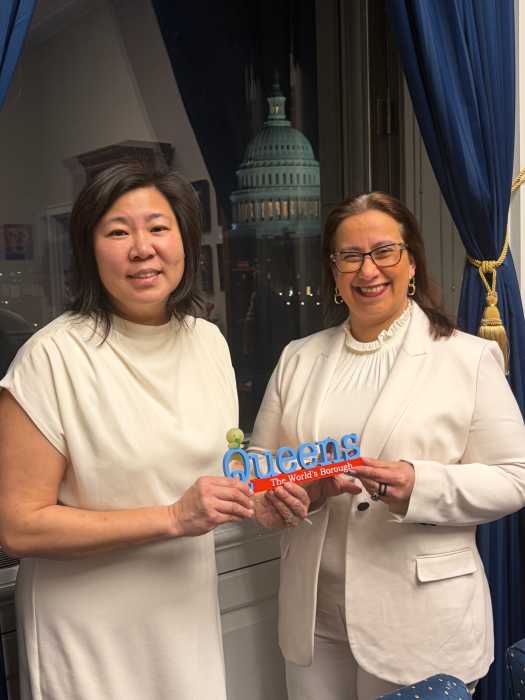State Senator John Liu held a town hall Wednesday, Aug. 17, at Flushing Library to discuss education with his constituents. Among the variety of topics discussed at the town hall were the ongoing battle over school budget cuts, recent legislation to reduce the size of NYC public school classes, the high school admissions process, special education, mayoral control and school governance.
Particular attention was paid to the class size legislation and budget cuts. Most of the members of the public at the town hall included parents and educators who were able to share their thoughts and concerns.
“Hearing directly from parents, students and educators about their experience with NYC’s public schools greatly helps to inform the policies and decisions we formulate in the state Senate,” Liu said. “There was a tremendous showing from our community this evening, clearly demonstrating that while we may be well on our way toward recovering from the COVID-19 pandemic, much remains unresolved when it comes to ensuring our schools are best serving our students. The Department of Education urgently needs all hands on deck to promptly address these many outstanding concerns, to get our schools back on track and to truly set our students up to succeed in the classroom and beyond.”
While some parents have been critical of the legislation that decreases class sizes, several teachers who spoke at the town hall said they’ve been overwhelmed by the large number of students in their classes, hindering them from being able to ensure each student is able to effectively learn. Some also said overcrowded classes prevented them from being able to build strong connections with their students.
Some of the main concerns expressed by those against reducing class sizes related to the possible displacement of many students and elimination of several programs helpful to students, including AP courses, gifted and talented programs and after-school programs. There were also concerns about how the Department of Education would make sure the schools are meeting the class size quotas. Liu said there has been a push to get the Department of Education to create more schools and classrooms in the districts in order to help quell these concerns.
According to Liu, overcrowded schools in New York City has long been an issue that he’s wanted to fix. He referred to a 2007 ruling by the State Supreme Court that overcrowded classes were violating students’ right to a sound basic education. While this resulted in an increase in school aid, this would not impact other programs like AP courses, gifted and talented programs and after-school programs. It is the constitutional responsibility of the state to not have overcrowded classes.
“Until we require the Department of Education to use the state funding properly and get class sizes within a range that is acceptable under the state constitution, we’ll still be in this same situation [of overcrowding],” Liu said. “As much as some schools or classes may be more ‘popular’ than others, that’s no excuse for continuing the endless cycle of excessively large overcrowded class sizes without any plan to finally reduce them.”
Liu noted that the reduced enrollment in New York City schools makes now an opportune time to work toward meeting these requirements. According to Liu, 58% of New York City school classrooms have already met compliance.
When it came to discussing the topic of school budgets at the town hall, many expressed concern over the budget cuts made to schools. Funding for New York City Department of Education was cut by $215 million in the latest budget passed by the City Council. These cuts were made due to a decline in enrollment. According to Liu, many of the City Council members he’s in touch with didn’t realize these cuts would go directly to schools.
While there is currently a lawsuit in place against these cuts from the approved budget, a ruling isn’t expected to be made until Aug. 29, leaving many schools in the dark as to how much funding they will actually have until around a week before the school year starts.
Some of the speakers at the town hall as well as Liu made the point that the budgets for each New York City school should be made based upon factors not just limited to the number of students enrolled and the needs of them, as stated in Fair Student Funding. Not as much emphasis is made on the students’ needs as the number of those enrolled.
A common theme among the educators who spoke at the town hall was that the budget cuts would hurt students in marginalized districts the most. They felt schools in districts like these should be considered for higher budgets. They said the needs of the schools and individual functions should be considered when determining school budgets.
One issue discussed at the town hall related to both school budgets and class sizes was the need to hire many more educators to teach these extra classes. Doing so would require additional funding.
While Liu understood and shared many of the concerns brought up at the town hall, he noted that he alone doesn’t have the power to address everything brought up. However, he hopes this town hall will help put pressure on the Department of Education, City Council and mayor’s office to consider what was brought up and try to better address these concerns.



































